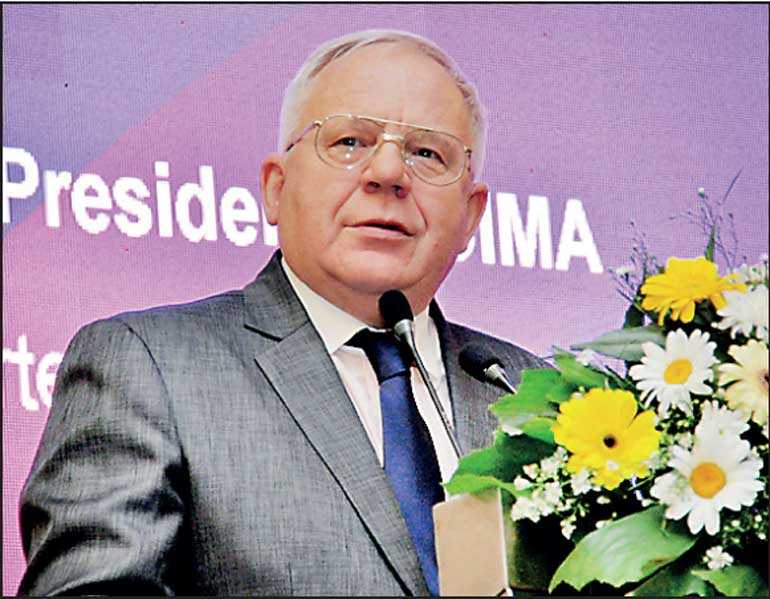Saturday Feb 28, 2026
Saturday Feb 28, 2026
Friday, 22 February 2019 00:08 - - {{hitsCtrl.values.hits}}

By Uditha Jayasinghe
Public employees must step up to serve the masses by breaking through archaic systems, improving efficiency and self-learning, Chartered Institute of Management Accountants (CIMA) President Steven Swientozielskyj said yesterday, warning that when the public sector is sluggish that could spill over into an overall development slowdown.
Drawing extensively from his 40-year experience in the British rail industry, Swientozielskyj, speaking at a CIMA event titled “Break Session on Lessons from British Public Sector to Improve Performance,” on Thursday, noted that it was the duty of public servants to serve the masses, but this is often lost in outdated systems, red tape, and bureaucracy. This calcified system then creates space for inefficiency, lack of transparency, and incompetence. He issued a “call to arms” for all public sector members, encouraging them to break through outdated systems, and find new ways to make their public institutions more efficient and effective.
“I took British Railway to a world class institution in just three years. So I’m here to tell you it can be done. The issue with the public sector is often described as an attitudinal one. But it can be changed. It can be changed based on what you are willing to do about it. What are you going to do about it? Are you simply going to look away or are you doing to create change? That is the difference.”
“The world does not owe you a living,” he said.
Swientozielskyj went on to say that he had to work hard to increate systemic change within his organisation, but even though he was audited about 16 times during the process, there were no negative statements, as the reforms improved efficiency and transparency. He advocated for public servants to create a “balanced economic model,” in their mind, that would allow them to provide services to the public, but also make the most of limited public funds.
“I don’t think the answer is to privatise the public sector. The private sector is driven by growth, but the public sector is driven by its responsibility to provide services. Nonetheless the public sector can take the best practices of the private sector and adapt them to their institutions. The duty of the public sector is to serve the public. But it must also be cost-effective and have good priorities for their services to be easily accessible to the public,” he added.
The CIMA President pointed out that unless efficiency is infused into the public sector, it would be difficult for a country to develop in the increasingly competitive global environment. In a world where 65% of children are studying for jobs that have not been created yet, and 375 million professionals will have to reskill themselves before 2030 in order to have a job, Swientozielskyj advocated for a dynamic public sector. He warned that without a progressive and efficient public sector to make crucial policy decisions and implement them, a country could be left behind and may see its growth being too slow.
Quoting figures from the World Economic Forum, Swientozielskyj stated that research had shown countries that can evolve their economies to sectors involving Artificial Intelligence, data gathering and data processing, and robotics, will have an edge over economies that are still dependent on traditional industries.
“For this shift to happen within countries, it is the public sector that has to play a key role. There is no magic here, it’s pretty straightforward. Singapore has become a successful country because its central policy is focused on one of the best education and training models in the world.”